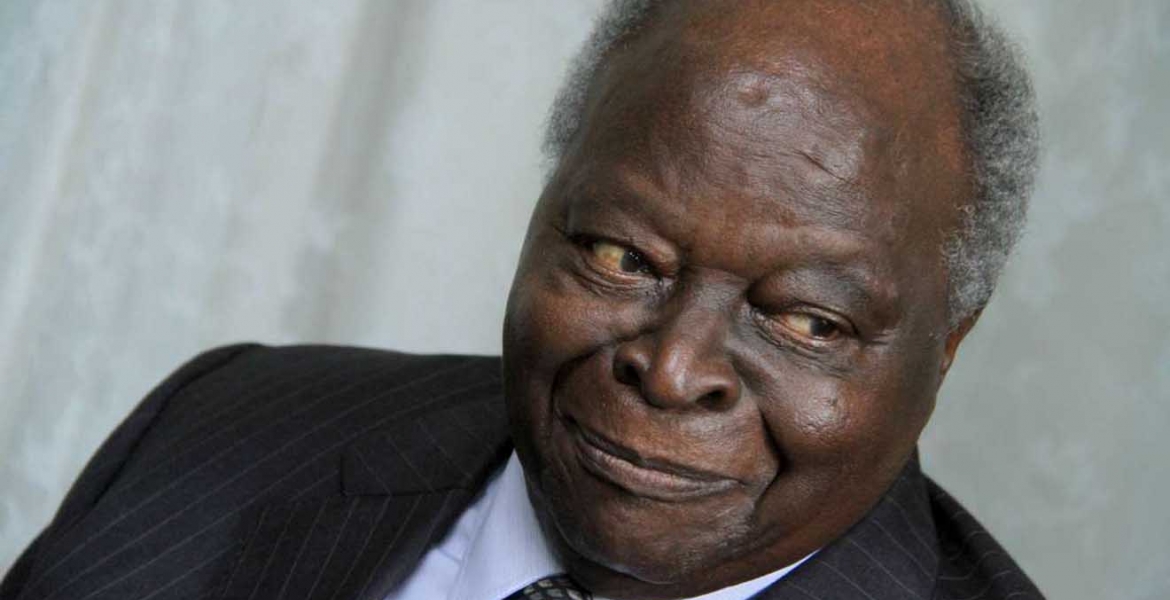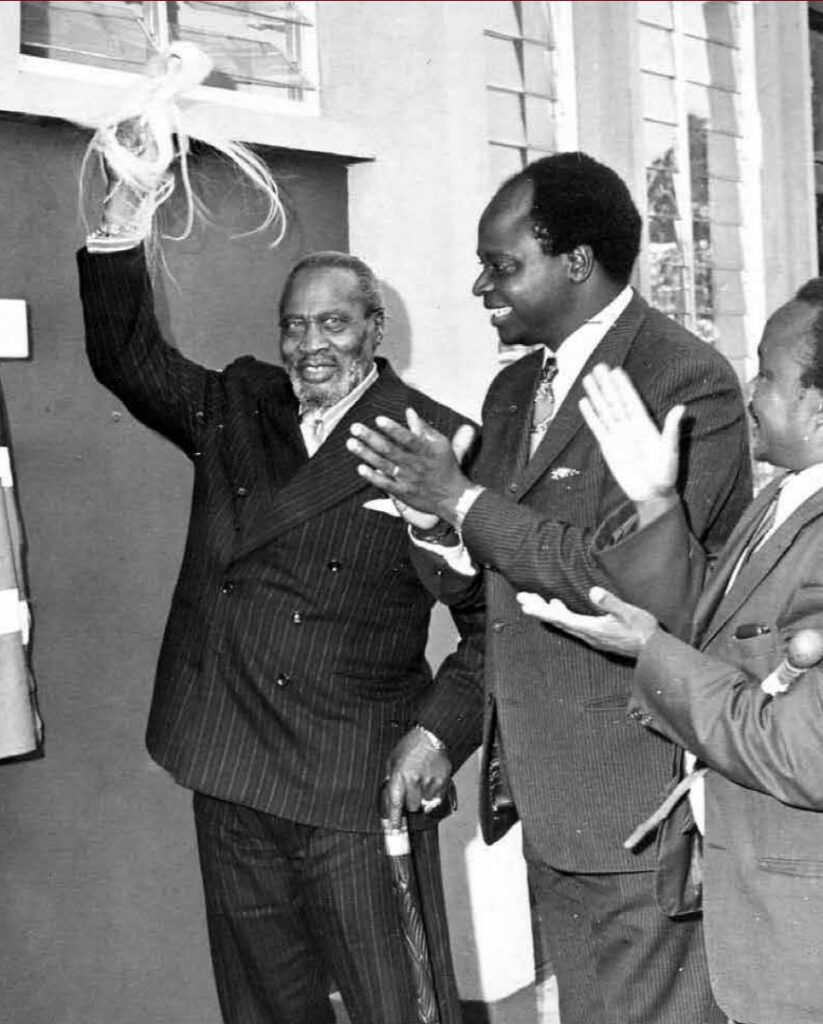
By Anthony Muchoki

Emilio Stanley Kibaki was born early in the morning of November 15, 1931. Named Mwai after his uncle from the mother’s side, his parents, John Githinji Kibaki and Teresia Wanjiku, had seven other children who, like all the others in the village, would help hew wood, till the garden, milk the cows and take them out to graze.
The young Kibaki was often left in the care of his elder sister, Waitherero, as their mother busied
herself in the garden and around the house. She would feed her young brother mainly on a diet of
roast bananas. “I would chew the bananas to a bolus then feed him,” she recalled in an interview,
alluding to an old African tradition of feeding children.
Catholic missionaries had established their base in the nearby Karima Mission. They started going into the villages looking for boys to attend school. According to Kibaki’s elder brother, Nderitu, the young Kibaki was nominated to be sent to mission school by his polygamous father, because he was “not very useful in the garden.”
In 1939 a barefoot Kibaki left home for the newly established, 50 cent-a-term Gatuyaini village school put up by the Consolata missionaries. Here they taught the new arrivals catechism and elementary education. And thus started Mr Kibaki’s passionate association with education and his Catholic faith. It also launched a brilliant career in academics and politics.
From Gatuyaini Primary, where he was for two years, Kibaki joined Holy Ghost Catholic Missionaries Karima Mission School (now Karima Primary) for the next three years, walking 10 kilometres every day to and from school. He passed his exams to proceed to Mathari School, a boarding institution, now renamed Nyeri High School and his father had to sell two goats to pay the annual Sh18 boarding fee. At Mathari, he learned carpentry and masonry and joined fellow
students in repairing furniture around the school.
It was at Karima that Kibaki was baptized Emilio. His father paid the Sh1 baptism fee. In the Nyeri High School register of 1930, Kibaki was entered as Pupil Number 1107: Emilio Mwai son of Kibaki Githinji and indicates he was there between 1944 and 1946.
KIBAKI IN HIS OWN WORDS
I am a democrat. I believe in the virtues and values of an open society. I am also a hard working man who believes that with careful reflection, careful planning and hard work “individuals and nations can change their circumstances of existence for the better. At the more personal level, I am a Christian and a humble, tolerant man who takes seriously his duty to God, to fellow man and to my country.”
“My parents were peasant farmers. They engaged in subsistence agriculture which involved rearing cows, goats and chicken as well as cultivating food crops, especially maize, beans, vegetables, yams, potatoes and tomatoes among other crops. They also engaged in trade where they could sell some of the agricultural produce at the village market.
Childhood
“Under the watchful eyes and caring hands of my parents as well as siblings, my childhood was enjoyable. I enjoyed playing with other boys in our neighborhood while rearing cows and goats or while chasing after antelopes in the woods.”
Challenges
“Waking up so early to go to school, sometimes in very cold weather and occasional caning by teachers were initially challenging. By and large, I enjoyed my days in primary and secondary school. My childhood was a very important since many of the impressions and attitudes I internalized during this period were instrumental in shaping me into the person I am today.”
Mau mau
Mau Mau was one of the key events during my childhood. This was an uprising against colonialism. It was the struggle that eventually freed our country from the bondage of colonialism. Without the Mau Mau rebellion, our country would probably be still under colonial rule. This struggle was therefore critical in asserting our dignity as Africans and taking responsibility over the destiny of our lives.
Colonialism
“If colonialism ever had merit, it was laying a foundation for education. Education has enabled our citizens to acquire the competencies we require to run our country and earn decent livelihoods.”
Politics
“Kenyans should re-orient their attitude towards politics. Politics must not be seen as a tribal contest. Politics must not be seen as an arena for settling scores or an avenue for the personal aggrandizement of the vanities of a few individuals. It must be seen as the process through which issues are articulated and resources allocated for the good of everyone in the country. Kenyans must now pursue issue oriented politics.”
Money
“Money is important but wealth creation is even more important. We must make money, but this should be done through hard work not short cuts. It is also important to appreciate that money is a medium of exchange. It should not therefore be accumulated for its own sake. Once money is made, it should be invested. This investment must be carefully planned so that the investment can generate more money and facilitate a virtuous cycle. This implies that money must be prudently managed. Since investments entail the means of creating wealth and employment opportunities, it is important to ensure that as many people as possible have access to money for investment. This is the way an economy grows and it calls for sound and strategic management of the financial sector in the country.”
Mineral discovery
“The minerals and the oil we are discovering must not destroy our country. Let us find ways of ensuring that these newly discovered natural wealth works for our counties and country in general. We owe this to present and future generations. Above all let us be a nation that puts God first.”
Education
“Education is now the most important factor of production. No one, no country can be competitive without massive investment in education. We must therefore ensure all our children have access to quality education. This is the only way of giving them a fair chance in life in today’s world. But it should not just be education. We must look at the particular bodies of knowledge and skills that are driving economies around the world and that will continue to do so in the foreseeable future. Let us focus on these areas and others that are relevant to the needs of our country and the world market.”
Environment
“After many years of poor environmental management all over the world, we are now facing the serious consequences of climate change. These consequences are dire, and include prolonged droughts and uncontrollable floods. Indeed more than ever before we are faced with cycles of drought and floods. These have severe consequences on our livelihoods and survival. We must do all that is necessary to reverse this trend by embracing the concept of green economy in its entirety. There is no shortcut and the choices are only two: we must protect the environment or perish.”
